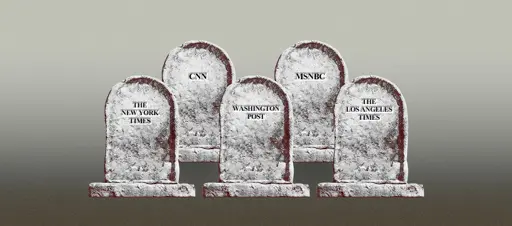The latest Gallup polling shows Americans’ trust in mass media at a historic low, with just 31% expressing “a great deal” or “fair amount” of confidence that news organizations report “fully, accurately and fairly.” Even more alarming, 36% of Americans now say they have no trust at all in the media—a staggering increase from the 6% who felt that way in 1972 when Gallup first started tracking this metric.
While legacy outlets still maintain the prestige, the buildings, the brand recognition, and the access, they’ve lost something far more valuable: credibility with the public. The past few years have made this painfully obvious, as one journalistic failure after another has demonstrated that these institutions aren’t equipped to handle our current moment.
It’s not just the endless “Trump in a diner” profiles that treat fascist supporters as passive victims rather than people with agency, as Brynn Tannehill argued in The New Republic. It’s also the normalization of the absurd—like Peter Baker at the New York Times treating Trump’s unhinged ramblings about annexing Canada as a serious policy proposal worthy of electoral analysis.
Nature abhors a vacuum, and journalism is no different. As the legacy press continues its slow-motion collapse, independent journalists are increasingly doing the heavy lifting of holding power to account.
We see it in how independent outlets were the first to call out the GOP’s anti-trans moral panic for what it was. We see it in how newsletters like Popular Information track corporate political spending and hypocrisy in ways the business press won’t. We see it when former newspaper journalists and editors, freed from institutional constraints, launch newsletters that expose the corruption and cronyism the mainstream press normalizes.
When the New York Times was treating Trump’s Tesla stunt on the White House lawn like a car show instead of corruption, independent outlets were the ones pointing out that having a president use the people’s house to promote his billionaire donor’s private company is, in fact, a serious ethical breach.



Sure it can, just not under the current system
And no one has defined what the future system would be